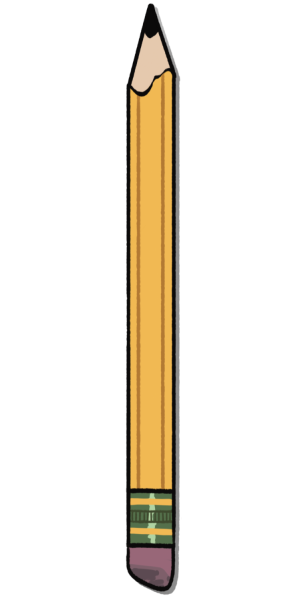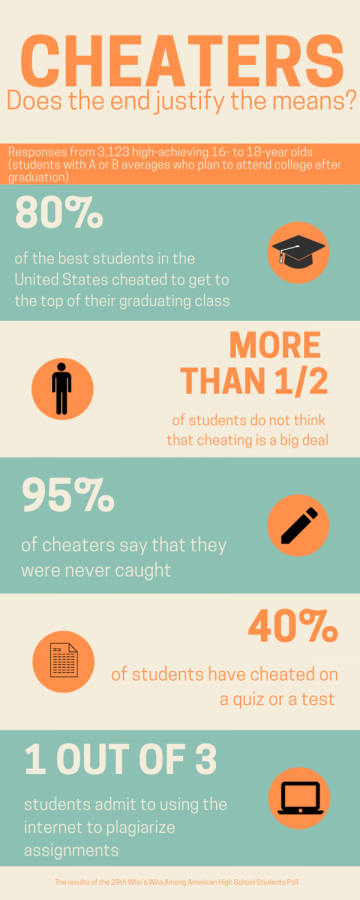EHS’ take on academic dishonesty
December 19, 2018
cover art by Hanna Faris
Effects of academic dishonesty in the short term and the long run
Unfortunately, plenty of students cheat. Many students at Edina High School have probably noticed their peers peeking at other papers during tests or have done so themselves. Cheating means deciding that a good grade is more important than learning and that it is worth the risk. Unfortunately, if a cheating student isn’t caught, there’s nothing to deter this mentality. The potential repercussions, however, should make most students think twice about looking over their neighbor’s shoulder.
Cheating is formally referred to as “academic dishonesty,” or “scholastic dishonesty,” which are terms that also include plagiarism and collusion. Academic dishonesty at EHS results in disciplinary action, and often an automatic failure of the assignment the student cheated on.
School policy says that for sophomores and older, a first offense calls for a one-day suspension, a second offense means a one to three day suspension and a third offense a three to ten day suspension. For freshmen, discipline is less severe, though multiple offenses still result in suspensions. This policy was last revised on July 17, 2018, replacing a more lenient one where the consequences for all students was the same as the current ones for freshmen.
In order for this system to actually come in to play, a teacher first has to report a cheating student to building administration. Next, the teacher calls home, and the student is brought down to the office. “I would have a conversation with them about what led up to it, ” Assistant Principal Michael Pretasky, who works with students frequently on issues of academic dishonesty, said.
“Then I assign something called Pathways, which is an in-school suspension. They would go during their student prep to visit with a Pathways coordinator, which would be one of our social workers, who will work with them on something called a restorative plan,” Pretasky said.
A student’s restorative plan involves a reflection and a strategy to rebuild trust with their teacher. Pathways, which is for a first offense, does not go on a student’s disciplinary record and so is not reported in a college application. If the cheating continues, however, discipline will be more involved.
Once a student gets an out-of-school suspension, this behavior has to be reported on the Common Application, which gets sent to almost every college a student will apply to. Counselors also send their own reports to the colleges to explain the situation. At EHS, the focus of intervention is on adjusting the student’s behavior rather than punishing them, because later on, the consequences can be much worse.
While policies at different institutions vary, students with a record of scholastic dishonesty are often ineligible for scholarships and less likely to be admitted to selective colleges. In the case that scholastic dishonesty goes unreported and is discovered after admission, some colleges may choose to revoke scholarships or even admission. If the behavior continues in college, a student could be suspended, expelled, or lose credit for a class even if they’ve paid the tuition.
In the event that their peers cheat, students should feel welcome to report it. “Students here work really hard and put in a lot of time. I think it’s frustrating to them to see somebody who’s copying, or cheating, you know, and not putting in the work,” Pretasky said. If people feel the need to report, they should tell their teacher. Ultimately though, the decision is at the student’s discretion.
When a student has already gotten scholastic dishonesty on their record, it’s best to reveal it upfront to colleges, rather than try to hide it. “We tell our students, that if it has happened, that they disclose that it took place and explain what was the circumstance, so that there’s a consistency between what the student puts down on their application as well as what the counselor puts down on their secondary school report,” EHS college counselor Bill Hicks said.
If there’s a discrepancy between the two reports, colleges will often contact the counselor to figure out the accurate details of the situation. At the same time, colleges understand that people make mistakes, so admitting a record of scholastic dishonesty isn’t the end of a student’s college dreams.
Cheating increases the chances of complications that no student or administrator wants to deal with. If a student is struggling, it’s best to seek help from teachers rather than resort to less-than-honest behavior.
Straight from the source: students and teachers weigh in on cheating
“A lot of people cheat. I recently saw three people cheating on my AP Psych test, looking up stuff on their phones. In ninth grade, my friend and I would study for a [math] test and then we would switch papers. I would study for a half and she would study for a half and then we would switch papers and fill out half for each other. Also, one time in Spanish I wrote the in-class essay ahead of time and then just switched the paper out during class and turned it in.”
“I see [cheating] everywhere. In most of my classes, I hear a lot about the test before I have to take it. It definitely should not be happening. AP Stats has a problem because all of the tests are available online and everybody knows it by the end of the year….some people figure it out at the start of the year and other people actually work the entire year. I never really memorized the answers but I did see the tests once or twice and knew what was going to be on it because of that.”
“I think even the best students worry about their grades so much that they will hire people to find the answers. I know a kid whose parents literally hire a tutor to find the answers online for Physics class. He’s a straight-A student. That happens a lot but also even people saying oh you can cheat off of me counts too…. Once I personally have memorized all of the answers that I put down and then told a kid who was taking it after me. But unless it is a multiple choice test like that there is no way you can do it that way. I think people care more about their grades then care about the immorality of cheating.”
“I feel like people cheat most on multiple choice tests. I have heard people talk about the answers. All you have to do is go up to a friend who took the test on an earlier period and ask what was on the test. People don’t see it as actually cheating because it is purely verbal. It’s just a conversation and people think that cheating is copying down answers. I think [teachers realize] and that is why they hand out different forms of tests, so they are addressing it.”
“I think it is definitely a silent epidemic that is happening throughout the school. Sometimes it is very subtle. One thing that I notice is, throughout the day as I am grading tests, my hours that are later in the day generally their averages are a lot higher than the ones that are first hour. With finals, especially at the end of the year, it is high stakes…Kids are feeling that stress and feeling overwhelmed with all of the other finals. Having any kind of advantage to take that final [early], when the opportunity came where the photos of the tests got out, all you have to do is just say “yes” and then you have access to it. The only thing that was hard about [that] last year is because it was the final and the last thing that I have of my students. It kind of left a bitter taste in my mouth,” biology teacher Ryann Longley said.
Teachers teach students to stay away from cheating
Teachers are aware when their students cheat – whether it be sharing information, taking photos, or peering at a neighbor’s exam. Although they are not able to eliminate cheating by word of mouth, teachers are able to prevent less discrete methods of cheating – something that the Edina High School Science Department has made a priority to focus on this year
Although it’s not unusual for students in high school to cheat in any class or subject, the science department as a whole has found this to be an obstacle worth tackling, seeing as it gets in the way of true learning.
At the beginning of the year, when teachers are going over their syllabi, many of them make it a point to discuss cheating and be upfront with the consequences a student will face if they decide to do it, in the hopes of disincentivizing students. “Before the first assessment, whether it’s a test or a quiz, I give an outline [on cheating]: here’s the expectations, here’s what cheating looks like, and here’s what’s not okay to do. I make it really clear that if they decide to cheat I’m going to hold them accountable and report it to the administration,” AP Biology and Human Anatomy teacher Stephen Sanger said.
A common tool that not only science teachers but teachers around the school have implemented in their classroom this year to prevent cheating are phone caddies. Every pocket in the caddy has a number assigned to a specific student in each class, that way if a student doesn’t put their phone in the caddy the teacher will be able to know. “Last year, I just had students place it in their backpack, but a lot of times kids kept them in their pocket. So [the phone caddy] is a way for me to guarantee that their phone is not on them, it’s in their caddy,” Biology and Human Anatomy teacher Ryann Longley said.
Because teachers at EHS cannot control what students say to one another about what’s on a test, they have found ways to vary the test versions between students. The test copy that a student receives is typically different than the one of the student sitting next to them. Some teachers even have different tests for different periods of the same class.
However, a lot of students have picked up on their teacher’s test administering habits and found ways to use that to their advantage. For example, if a student knows that there are only two different prompts or sets of questions being administered, then they can more easily prepare by reaching out to their peers that have already taken the test.
To get around this loophole, Biology teacher Katrina Stern switches up how her tests are laid out and administered for each unit. As a baseline, she creates at least two variations of each test, although more often than not she creates even more. Each variation has a specific number and form letter on it so Stern can make sure that they are passed out in a manner in which students cannot glance at a peer’s exam, and so she can assure that she has received all of her tests back at the end of the hour.
No matter how much teachers do to prevent it, cheating is a part of age-old high school culture that might never go away. “The unfortunate reality is that we have to crack down on test security, in ways that we shouldn’t have to. I feel like I don’t know always how students cheat and so it’s this arms race. There’s this expectation that students are gonna cheat so we have to come up with ways to beat it. I wish that students would have more integrity,” Stern said.

